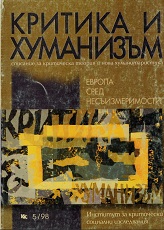Блез Паскал - езикът и дневникът
Blaise Pascal - Language and the Diary
Author(s): Raicho PozharlievSubject(s): Social Sciences
Published by: Фондация за хуманитарни и социални изследвания - София
Summary/Abstract: The paper is an attempt both to grasp the multiformity and the thematic diversity of the work of B. Pascal and to understand the spirit of his philosophy in a correct and unbiased manner. The author dwells on the scepticism of Pascal's philosophy, of his searchings and ambitions towards the trustworthy beginning that would be a mainstay for man in the insecurity of human being. The starting point of Pascal's philosophy is found in the critique of language. The analysis of language reveals both the conditionality and falsity and the universality of language. For Pascal, language is more universal than thinking since we can talk of things that it is hard for us to think, such as infinity. It is universal also because we call things that do not exist. For Pascal, in principle one can talk of anything and this is why the critique and 'purification' of language is a procedure of special importance. It shows the way to genuine human values, to the human clarity of being and stability. Pascal carries out this critique by firstly pointing out the forms of linguistic deceptions, language's biases and falsities. Further, however, the thinker's recommendations follow on the right use of words. They must be used in reconciling the opposite views of the world, often in a figurative and symbolic meaning, but mostly as, uttering our words, we send them in our thought towards God as the higher instance. In our humility before Him, we cannot lie and our word becomes doubtless. The words so uttered becomes responsible and referring before ail to ourselves and our self-understanding. This affects the genre of Pascal's thoughts. For the author, they are a kind of intellectual diary; a record of the meaning insights of the thinker, of these momentary revelations in which the philosopher meets infinity. The author believes that the sense of this philosophy becomes far clearer in a comparative analysis of the genre of diary in Pascal and the rationalistically written ship diaries of that time. Using many examples, he reveals the relation of the style of thought in ship diaries with the style of methodical rationalism of Descartes. The géométrisation of thought, the spatialisation of time here, the neutrality towards human emotions, the formalism etc. bring ship diaries close to Descartes and completely opposite to Pascal's diary. Pascal points to the winding road of man to himself, the boundlessness of thought together with a conscious nothingness of our world. This is a diary of time in search of infinity, of the human searching for his place in being. In this diary, the philosopher's though wanders, not finding a port, but maybe this is what heightens and deepens it, raising it up to God and to man.
Journal: Критика и хуманизъм
- Issue Year: 1998
- Issue No: 05
- Page Range: 139-148
- Page Count: 10
- Language: Bulgarian
- Content File-PDF

